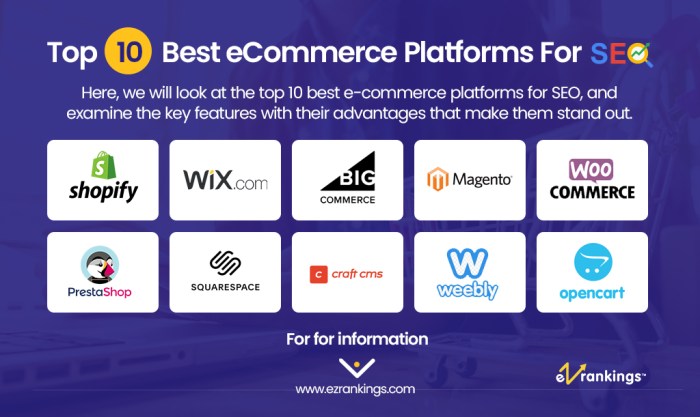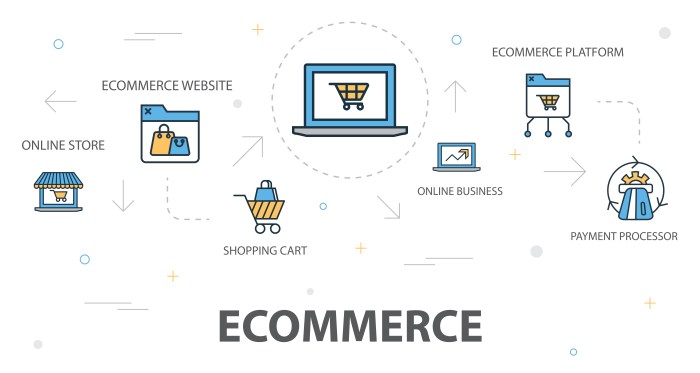E-commerce platforms revolutionize online businesses with their diverse features and robust security measures. Dive into the world of e-commerce platforms for a thrilling exploration of possibilities and protection.
From customization options to user experience enhancements, discover the key elements that make e-commerce platforms a game-changer in the digital realm.
Overview of E-commerce Platforms
E-commerce platforms are online software applications that enable businesses to create, manage, and operate their online stores. These platforms provide a variety of tools and features to help businesses sell products or services over the internet, making it easier for them to reach a global audience.
Importance of E-commerce Platforms for Online Businesses
E-commerce platforms play a crucial role in the success of online businesses by providing a user-friendly interface, secure payment gateways, inventory management, order processing, and marketing tools. These platforms allow businesses to establish an online presence, increase sales, and expand their customer base without the need for a physical storefront.
Examples of Popular E-commerce Platforms
- Shopify: Known for its ease of use and customizable features, Shopify is one of the most popular e-commerce platforms in the market.
- WooCommerce: A plugin for WordPress websites, WooCommerce is a flexible platform that allows businesses to create online stores with ease.
- Magento: Ideal for larger businesses with complex needs, Magento offers advanced features for scalability and customization.
- BigCommerce: A robust platform that caters to growing businesses, BigCommerce provides a variety of tools for online store management.
Key Features of E-commerce Platforms

When it comes to e-commerce platforms, there are several key features that businesses look for to ensure smooth operations and increased sales. Let’s dive into some of these essential features:
Customization Options
Customization options are crucial for businesses looking to create a unique and personalized online store. From choosing the layout and design to adding specific features like product filters and search functionality, customization allows businesses to tailor their e-commerce platform to meet their specific needs and branding requirements. The ability to customize the platform also ensures a seamless user experience for customers, ultimately leading to higher conversion rates and customer satisfaction.
Payment Processing Options
Payment processing is a critical aspect of any e-commerce platform, as it directly impacts the checkout experience for customers. Different e-commerce platforms offer various payment processing options, including credit card payments, digital wallets, and alternative payment methods like PayPal or Apple Pay. Businesses need to choose a platform that supports a wide range of payment options to cater to diverse customer preferences and increase the likelihood of completing a purchase. Additionally, the security and reliability of the payment processing system are essential considerations to build trust with customers and protect sensitive financial information.
User Experience on E-commerce Platforms

Having a user-friendly interface is crucial for e-commerce platforms as it directly impacts customer satisfaction and conversion rates. A seamless and intuitive design can enhance the overall shopping experience, making it easier for users to navigate, find products, and complete transactions.
Importance of Mobile Responsiveness
Mobile responsiveness plays a vital role in enhancing user experience on e-commerce platforms. With the increasing use of mobile devices for online shopping, it is essential for websites to be optimized for various screen sizes and resolutions. This ensures that users can easily access the platform, browse products, and make purchases on their smartphones or tablets without any issues.
- Responsive design improves accessibility and usability on mobile devices.
- It enhances loading speed and performance, reducing bounce rates.
- Mobile-friendly interfaces create a consistent experience across all devices.
Examples of Exceptional User Experience Design
Some successful e-commerce platforms known for their exceptional user experience design include:
- Amazon: With personalized recommendations, easy navigation, and a seamless checkout process, Amazon offers a user-friendly interface that keeps customers coming back.
- Apple Store: Known for its clean layout, high-quality product images, and simple navigation, the Apple Store provides a pleasant shopping experience for users.
- Etsy: Focused on handmade and unique products, Etsy’s platform features intuitive search functions, user-generated reviews, and a visually appealing design that enhances user engagement.
Security Measures on E-commerce Platforms
When it comes to e-commerce platforms, security is a top priority. These platforms implement various security protocols to protect customer data and ensure safe transactions.
SSL Certificates and Data Encryption
One of the key security measures used by e-commerce platforms is the implementation of SSL certificates. SSL (Secure Sockets Layer) certificates help encrypt data exchanged between a user’s browser and the website they are visiting. This encryption ensures that sensitive information such as credit card details, personal information, and login credentials are secure from potential cyber threats.
Fraud Prevention and Customer Trust, E-commerce platforms
E-commerce platforms also focus on fraud prevention to maintain customer trust. They employ advanced fraud detection tools and algorithms to identify suspicious activities and transactions. By monitoring user behavior and transaction patterns, these platforms can flag potential fraudulent activities and take necessary actions to prevent them. This proactive approach not only safeguards customer data but also enhances the overall trust and credibility of the e-commerce platform.
